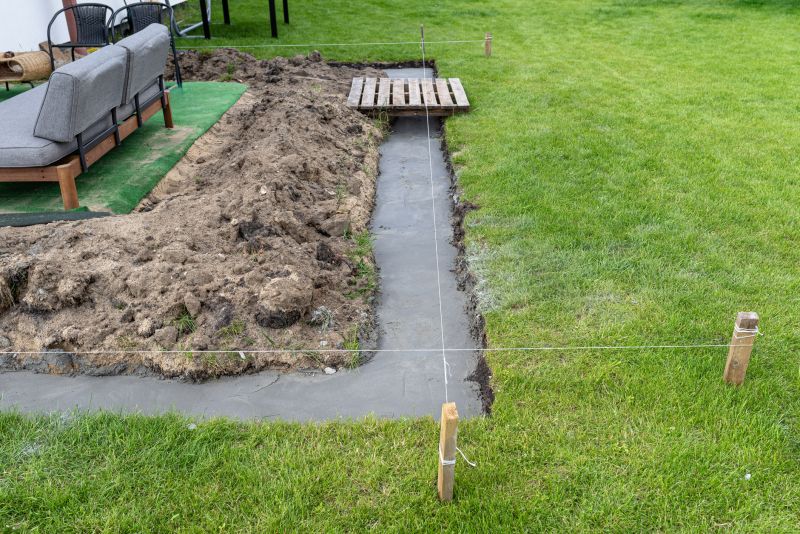Popular Tools and Materials For Concrete Footer Construction
Explore the most used products that help achieve strong, stable, and long-lasting concrete footers with ease.
 Installing a sturdy and reliable concrete footer is essential for the stability and longevity of various structures, from small sheds to large commercial buildings. The process begins with selecting appropriate products that can withstand the weight and environmental conditions of the site. Properly chosen materials ensure that footers provide a solid foundation, reducing the risk of shifting, cracking, or settling over time. Whether you're a seasoned contractor or a DIY enthusiast, understanding the range of available products helps in making informed decisions for successful installations.
Installing a sturdy and reliable concrete footer is essential for the stability and longevity of various structures, from small sheds to large commercial buildings. The process begins with selecting appropriate products that can withstand the weight and environmental conditions of the site. Properly chosen materials ensure that footers provide a solid foundation, reducing the risk of shifting, cracking, or settling over time. Whether you're a seasoned contractor or a DIY enthusiast, understanding the range of available products helps in making informed decisions for successful installations.
Top Overall Option
Heavy-Duty Concrete Form System
A versatile and durable form system designed for various footer sizes and shapes, offering easy setup and removal. Made from high-quality materials, it provides a smooth finish and can withstand multiple uses, making it suitable for both professional and DIY applications.
Types of Products For Concrete Footer Installations
Plastic Form Boards
Lightweight and reusable forms ideal for shaping concrete footers with clean edges.
Metal Form Frames
Heavy-duty metal forms providing precision and durability for large or complex footer shapes.
Wooden Form Stakes
Traditional wooden stakes used to support and shape forms during concrete pouring.
Reinforcing Steel Bars (Rebar)
Steel reinforcement bars that add tensile strength to concrete footers, preventing cracking.
Wire Mesh Reinforcement
Mesh panels that provide additional reinforcement across larger footer areas.
Anchor Bolts
Metal bolts embedded in concrete to secure structures or equipment to the footing.
Spacer Blocks
Plastic or metal spacers that maintain consistent concrete thickness and positioning of reinforcement.
Form Release Agents
Chemical solutions applied to forms to prevent sticking and ensure smooth removal.
Concrete Mixers
Portable or stationary mixers used to prepare concrete on-site for footer installation.
Concrete Sealants
Protective coatings applied after curing to enhance durability and resistance to moisture.
Vibrators for Concrete
Tools used to eliminate air pockets and ensure proper compaction of concrete within forms.
Form Ties
Support elements that hold forms together securely during concrete pouring.
Expansion Joints
Materials that allow for movement and prevent cracking due to temperature changes.
Footing Drilling Equipment
Tools for creating precise holes in concrete footers for anchoring or wiring.
Popular Choices
Widely used for their reusability and ease of handling in footer shaping.
Commonly selected for adding strength to concrete footers in various projects.
Popular for providing additional support across larger footer areas.
Frequently used for securing structures to concrete footers.
Essential for smooth form removal and a clean finish.
Commonly employed for preparing consistent concrete mixes on-site.
Standard equipment for ensuring proper compaction and reducing air pockets.
Often incorporated to accommodate movement and prevent cracking.
Popular for protecting finished footers from moisture and wear.
Commonly used to maintain form integrity during pouring.
Concrete footer installation products include a variety of forms, reinforcements, and accessories designed to facilitate accurate placement and durability. Forms are used to shape the concrete while it sets, and they come in different materials such as plastic, metal, or wood. Reinforcement products like rebar or wire mesh are critical for adding tensile strength, especially in load-bearing applications. Anchors, spacers, and sealants also play vital roles in ensuring the footer remains secure and protected from moisture or shifting soil.
Choosing the right products depends on factors such as the size of the structure, soil conditions, climate, and specific project requirements. Proper planning and selecting compatible components can lead to more efficient installation processes and longer-lasting results. It is also important to consider the ease of use, compatibility with other materials, and the manufacturer's specifications to ensure a seamless construction experience. Investing in quality products tailored to your project's needs can contribute to a solid and durable foundation that supports your structure effectively.
Overall, understanding the variety of products available for concrete footer installations empowers builders and DIYers to create stable, long-lasting foundations. From basic formwork to advanced reinforcement options, the right tools and materials are crucial for achieving optimal results. Careful selection and adherence to best practices can help ensure that your concrete footers perform reliably for years to come.
Key Buying Considerations
- Compatibility with your specific footer size and shape requirements.
- Material durability and suitability for the environmental conditions.
- Ease of handling and installation, especially for DIY projects.
- Reusability of forms and accessories to maximize value.
- Reinforcement strength and compatibility with concrete mix specifications.
- Type of form material that provides the desired finish and precision.
- Availability of accessories like spacers, ties, and sealants.
- Budget constraints balanced with quality and longevity.
- Manufacturer reputation and product reviews for reliability.
- Ease of removal and clean-up after the concrete has set.
- Compatibility with other construction materials you plan to use.
- Weight and portability of forms and reinforcement products.
- Specific project requirements such as load capacity or soil conditions.
- Availability of technical support or instructions from the supplier.
- Local building codes and standards compliance.
This content includes affiliate links. We may earn a commission if you purchase through these links, at no additional cost to you.
